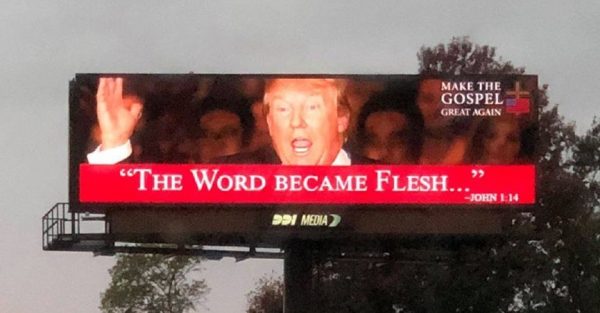It can’t be real. That was my first impression when I saw pix of the blasphemous billboard circulating around the interwebs. It just looked too hokey and too perfectly outrageous. But, as Sam Wineburg is telling us, we need to be asking different questions these days. Our old-fashioned sniff tests are way out of date. What’s worse, even Wineburg’s hopeful prescription can’t help us with some problems. Namely, as with this billboard, political realities have gotten so bizarre I’m losing hope that any of us will have much luck discerning the true from the troll.

This can’t possibly be real…can it?
It looks so perfectly anti-Christian that I was sure it had to be a spoof. And spoof it may be, but at the very least it seems to be a real billboard. According to Snopes,
The billboard is undoubtedly real, though it is not yet clear who paid for it and when it was erected. A spokesperson for DDI Media, the St. Louis company which owns the billboard itself, told us they could not share such information.
As SAGLRROILYBYGTH know, I personally don’t care about heresy, but I am absolutely flummoxed that any self-identified Christian would equate the Donald with The Christ. The entire episode seems like more proof of Sam Wineburg’s new argument. We can no longer trust our sense of what “looks” and “feels” real and legitimate. It’s just too easy to fake it.
Among other things, Professor Wineburg describes his study of internet readers. He asked ten academic historians to decide which group was more trustworthy based on their websites, the American College of Pediatricians and the American Academy of Pediatrics. One (ACP) is a legitimate professional organization of doctors. The other (AAP) is an anti-gay splinter group.
Turns out, these historians—all of them hyper-trained to read and decode complicated texts—weren’t very good at figuring out how to evaluate on-line legitimacy. As Wineburg writes,
Typically, the historians would size up a site within seconds. Snap judgments were often based on a site’s “look” or its official-sounding name. . . . [one] chose the established American Academy of Pediatrics, not because of differences in the organizations’ stature or pedigrees (he never ventured beyond the two sites to learn about these organizations respective backgrounds), but because of the fonts on their webpages.
As Wineburg points out, evaluating online information based on these sorts of impressions is woefully out of date. Back in the wild 1990s, we used to be able to evaluate information based on the look of the website. Shoddy graphics, sketchy organizational details, and over-long web addresses were all easy give-aways.
These days, those markers are simply too easy to fix. A fly-by-night extremist organization can have a website that looks and feels legit.
Wineburg has hope. Students and the rest of us can learn better tools to detect online fraud and fakery. We can learn to read the web laterally instead of trusting any one website.
As this billboard episode shows us, though, perhaps we need to be more concerned than that. For me, the billboard appeared fake not only because it looked poorly made, but because its message was so outrageous. So, yes, I thought it was fake because it looked kind of blurry and because it didn’t include any information about its source. But I also thought it was fake because no Christian could possibly have intended to advertise such a blatantly blasphemous message.
Yet someone did. Clearly, the old fashioned sniff tests can’t help us anymore. Fake information can look real. Even worse, though, ideas that would have been too hateful to see bruited about in public spaces now seem common.





Donna
/ November 6, 2018I can’t unsee this.
Agellius
/ November 6, 2018I did not understand the billboard as equating Trump with Christ. I understood it as co-opting Trump’s slogan, “Make American Great Again,” but applying it to the Gospel instead. The photo of Trump was just to make clear that the slogan “Make the Gospel Great Again” was a take-off on MAGA. And also to make it appealing to Trump supporters.
I understand you reading it the way you did, and that interpretation did cross my mind for a second, but I immediately dismissed it as unrealistic. However I grant that it was a clumsy effort. Someone should have realized how it could come across and nixed it in favor of some other design.
Ruth
/ November 6, 2018I can see you giving the billboard authors the benefit of the doubt. Though if their intention was simply to “Make the Gospel Great Again,” and associate that with Donald Trump’s slogan and even Donald Trump, himself, perhaps they could have chosen a different scripture. The implications in the photo of Donald Trump juxtaposed with that particular scripture seems to be that Donald Trump is “the Word made flesh.”
It does seem unrealistic that any Christian group would be so blasphemous. There are times, though, that I fully expect them to equate him with the Second Coming. I’m not sure they don’t believe he walks on water.
Agellius
/ November 6, 2018It’s not so much the benefit of the doubt, but an inside understanding of how Christians think. As a Catholic, I’m very aware of how Protestant Christians tear down the Catholic veneration of Mary, because it raises her too close to the level of Christ. But she is Christ’s own mother. If they won’t venerate her, would they worship Trump?
Granted there could be some crackpot sect that really does think Trump is the Second Coming, but if so, I guarantee they won’t find any substantial following among American Christians.
Ruth
/ November 6, 2018I was a Protestant Christian in the Bible Belt. I’m very aware of their views of the Catholic Church.
I have been taken aback by their defense of this president. I have heard and seen things that I would never have believed.
Adam Laats
/ November 6, 2018I guess that’s how I immediately took it as well. That is, I’ve been taken WAY aback by some of the evangelical defenses of Trump I’ve seen. I assumed this was another extreme version of that sort of “I don’t care what the Bible says I love Jesus and Trump.”
Ruth
/ November 6, 2018Exactly. This would probably one of the more extreme versions of it, but I’ve seen many comparisons by my former evangelical brethren of Trump to Christ.
Adam Laats
/ November 6, 2018…really? I thought it was unrealistic, too. Shockingly so. But to my mind–and I admit it’s an anti-Trump, anti-fundamentalist mind–the clear, in-my-face message of this billboard is that the Donald IS the Word become flesh.
Agellius
/ November 6, 2018By “unrealistic” I meant that I found it unrealistic to think that a Christian group actually intended to advertise Trump as the Second Coming of Christ, and therefore it had to be a gaffe of some kind. And since there is a plausible alternate interpretation, I went with that.
Hey, it could actually be some crackpot group of Trump-worshippers. But between the two, IMHO my interpretation is more likely.
Adam Laats
/ November 6, 2018The other possibility that makes sense to me is that this is an intentional provocation–a spoof. Some anti-Trump, anti-fundy group could have put this up to make people THINK evangelicals were blaspheming their way to the ballot box.
Adam Laats
/ November 6, 2018Update: There is a group that is now claiming credit for the billboard, which has been taken down: https://www.kmov.com/news/make-the-gospel-great-again-large-billboard-of-trump-removed/article_538f78d0-e0a9-11e8-b68e-4735053c1e10.html?fbclid=IwAR1lnG2M322rE1yvUe_T3srkPqWICD8exohk4VCwfIhZDb5qRlpLpBV7Fuk
Adam Laats
/ November 6, 2018In the words of the group who claimed credit for the sign: “Our billboard IS NOT equating Jesus with President Donald Trump. Salvation comes only from a personal relationship with Jesus Christ, not any man. But God does send his messengers to us, and just as King David liberated the faithful in his day, President Trump is doing this today through his protection of the unborn, defense of our land against foreign invaders and standing up for Israel. He surrounds himself with champions for Christian Rights –Mike Pence, Neil Gorsuch, and Brett Kavanaugh. Compared to the disaster of a president we had in Obama, how is this not the “word become flesh” for Americans? As Christians we must not stand against God’s will despite the persecution we face for doing so.”
Agellius
/ November 6, 2018Ohhhh, I get it now. They’re using “word become flesh” to mean something like “God’s will made manifest”.